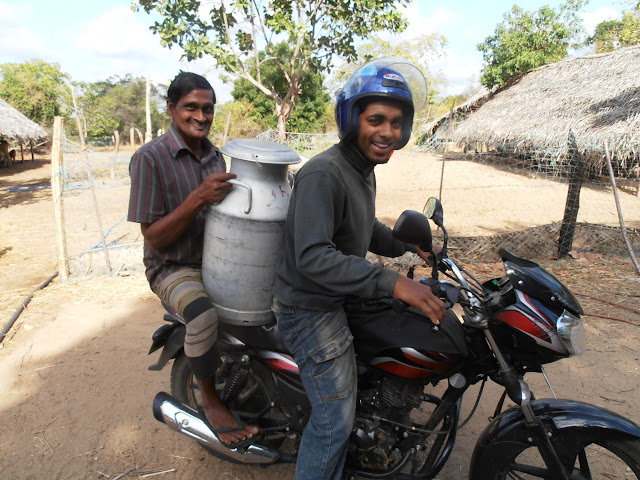Chris, one of Bellbunya Sustainable Community's founders has been in Sri Lanka for the AGM of the Global Ecovillage Network Oceania and Asia and he has just visited Eco Community Sri Lanka...
The speedometer on the bus read 0km/h which didn’t seem too inaccurate as I alternated between roasting my rear end on the gearbox and standing. I was on my way to Eco Community Sri Lanka (ECSL), about 6 hours from the nation’s capital, Colombo.
Chaminda, one of the founders had responded enthusiastically to my request to visit and exchange our ecovillage insights and lessons.
 |
| Chris & Chaminda at the community kitchen - earth building & solar light |
The community was started by a group of friends, studying Chi Gong together under their teacher Aruna. Thilena contributed his savings from 5 years of factory work in Korea and Eco Community Sri Lanka was born.
Aruna describes their vision as "mutual completion" which is about working together to achieve shared goals. He believes that each person has a special "Universal Task" and that in finding and following this "task" we will be building a better world for all. Following this philosophy, Chaminda left his well-paid job as an NGO aid and development worker to volunteer fulltime at ECSL to make a "real difference".
A down side of the large amount of international development aid that Sri Lanka receives is a culture of financial dependence that sometimes develops in NGOs. In contrast, ECSL is entirely self funding. Community members have contributed their own resources and they have a number of farm-based businesses, with more in development. ECSL has 450 loman brown chickens, 1400 indigenous chickens (most are not yet at the point of laying eggs), 38 turkeys, 48 cows, 37 goats. They sell on average 3600 chicken eggs per week and 350 litres of milk. They have two plantations of 800 organic papaya trees, 60 cashew trees, hundreds of pumpkins and eggplants and, when the rains come, will plant rice.
 |
| Taking fresh milk to the co-op |
Right now, everyone is hoping for rain. The paddy fields are bare. Other farmers have burnt their fields (they don't do this at ECSL) and are waiting to plant. The monsoon is now a few weeks late, which makes things very difficult. And it's not just for the farmers. Each night now up to 50 wild elephants come seeking food. Farmers try to scare them away from their homes and crops with fire crackers, yelling, bonfires and lights. It's dangerous and tiring but, at this time of year, it's a struggle for survival. These conflicts are common in Sri Lanka, as wild land for elephants to free range diminishes.
At ECSL, they are wondering how to balance the needs of people and nature. Stephanie, an Irish permaculture teacher from Auroville in India is developing a permaculture plan for the kitchen garden. A permaculture plan for the whole site would be great - trees, mulch and compost are particularly important.
Buildings are efficient - compact and made of local materials, with traditional mud walls and palm frond roofs. The community is off the grid, with a number of small solar panels providing for LED lights and a water pump.
 |
| Volunteer accommodation - natural earth building |
The need for agrochemical-free farming was highlighted to me by the alarming level of kidney failure in Sri Lanka. Current research by the World Health Organisation shows a growing problem around the world - that began to emerge amongst poor rural farmers in the 1990s. It appears that ground water tainted with cadmium and arsenic from chemical fertilisers and pesticides are a key factor. Chaminda and the crew are trying to work out how best to assist the farmers in their area.
On the social level, sometimes ECSL volunteers teach English at the local school. They have also established and run the WWOOF (Willing Workers on Organic Farms) network in Sri Lanka.
As a small and new community, ECSL has achieved a surprising amount already. They are warm and welcoming and provide volunteers with a great opportunity to be a part of the life of a small rural community. They are open to new community members and volunteers (particularly if you have skills in website development or alternative technologies). For more information, go to http://ecocommunitylk.blogspot.com
Article by Chris Gibbings. Chris is co-founder of the Bellbunya Sustainable Community (www.bellbunya.org.au) on the Sunshine Coast in Australia and Vice President of the Global Ecovillage Network Oceania and Asia (http://genoa.ecovillage.org/).
 |
| Chris meeting with community members |
No comments:
Post a Comment